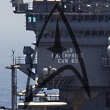
Imagine this scenario: A massive ship rests in its dock as the crew prepares for departure. Orders are given and acknowledged. A course is laid. Whistles echo through the decks. Dock lines fall to the side, and the ship clears the last mooring. What happens next? Is this a warship cutting through ocean waves headed for the Mediterranean? Or is this a starship disappearing in a warp speed flash of light headed for strange new worlds? Their missions may be entirely different but similarities between today’s military and Star Trek’s Starfleet remain evident. On the program of Creation Entertainment’s Star Trek Convention Las Vegas last month, a panel of veterans presented and discussed military aspects of Star Trek and similarities between Starfleet and the armed forces.
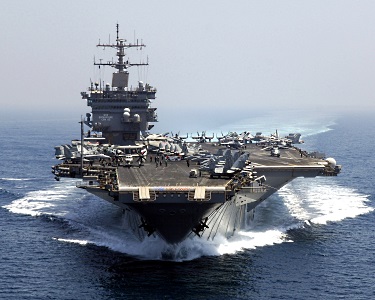
The parallels between Star Trek ships of the fleet and large navy craft are obvious. Starfleet has many similarities to the naval organizations of the real world. Such examples can be found throughout each show or movie of the franchise. Although Star Trek’s prime mission is deep space exploration and research, Starfleet also exists as a peacekeeping and defense organization. Much already has been studied, reported, written, blogged, and stuck on electronic bulletin boards referencing Star Trek’s military themes. It’s almost unfathomable how many levels discussion can encompass the similarities and differences between real world military groups and Star Trek (para)military groups. Trek fans love to compare weapons, vessels, tactical engagement, chains of command, training, ranks, strategies, wars, battles and the characteristics of various groups of enemies.
But the Las Vegas convention panel event, the discussion went “above and beyond….” Panel members explored personal military experiences and personal opinions about Star Trek military themes and situations. Members of the panel were: Jeanne Domenech (US Army Ret.), AJ Kwan (USAF Ret.), Mark Strosin (Active Duty Navy), Michael Nguyen (Army Reserve), and Doug Murray (US Army).
Many questions posed of the veterans on the panel were about their service and similarities to Starfleet. The panel compared training and leadership, decision making, risk calculating, and military realism in Star Trek. The panel members talked about how their perceptions of Star Trek has not only affected their military career but also the effect their military training has had on their views about various aspects of Star Trek for each of the different series, plots, storyline situations, tactics, and technology.
The panel began with a PowerPoint presentation which included a comprehensive military background of Star Trek, starting with the service duty of Star Trek creator Gene Roddenberry’s U.S. Army Air Corps career and subsequent job as a police officer.
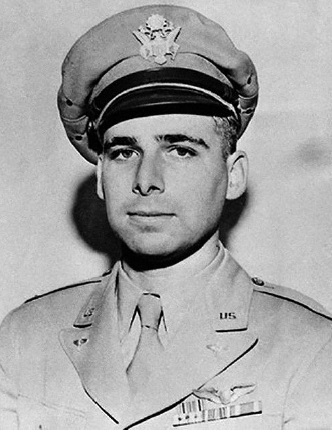
Reports are Roddenberry used military concepts for the initial ideas to create Star Trek. This was furthered by production staff like Robert Justman who served in the US Navy during WWII, and Matt Jefferies (designer of the starship Enterprise) who was a bomber pilot in WWII. The presentation outlined a number of Original Series (TOS) episodes containing military themes. Among these: “Balance of Terror” with its destroyer-submarine similarities; “Court Martial,” “The Menagerie Parts I & II,” and “Turnabout Intruder” with stories focusing on court martial proceedings, “Errand of Mercy” in which fleets of ships stop an invasion force and James Kirk refers to himself as a soldier.
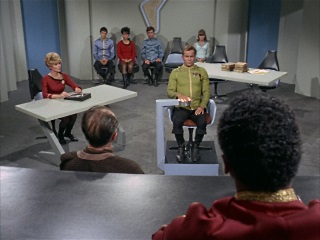
Another segment of the convention panel’s program included a look how the name, Enterprise is used throughout history for military ships. In addition, the name Enterprise has been a motorboat, steamboat, balloon and a U.S Navy training facility. This was followed by a recap of the various Enterprise ships in Starfleet throughout history of Star Trek. Going through this naming convention again is like reviewing a short video take of how aviation evolves into space flight — similar to the video intro to Star Trek: Enterprise. It always has good audience appeal, especially to Trek fans. An entire segment of Star Trek fan culture exists to the study of ships of Starfleet, their structural design, mechanics, power capabilities, living quarters and weapons.
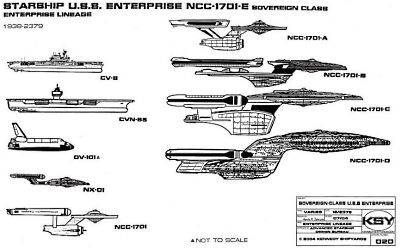
Members of the panel told the Las Vegas convention audience which characters in Star Trek they most admire or emulate, how realistic they believe some storyline situations were played out, their thoughts about technological developments, issues associated with command and of service and ancillary topics. What was most interesting was how some ethics or leadership lessons depicted in Star Trek shows, particularly The Original Series (TOS), aided in making decisions during their military service — and civilian life as well. One panel member, AJ Kwan described how Star Trek had an influence on him to join the military. He described: it’s common to hear how Star Trek has had an influence on young fans to become scientists or astronauts, adding Star Trek had an impact on his decision to join the military. The leadership qualities of James Kirk and lessons of values from the show inspired him.
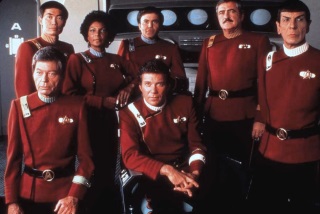
Finally, panel members agreed that The Original Series holds more similarities with actual military service, at least as they have experienced it. They felt that military situations in the newest Star Trek films by J.J. Abrams had the least military realism. One example that they humorously cited, was from the 2009 film — when Kirk jumps in rank from midshipman to captain in a single day.
There’s a kind of common denominator at work: police officers, firefighters, astronauts, members of the armed services, even Starfleet personnel all need to operate in high pressure situations. A cool and calm demeanor and following procedure help make the mission a success even in the worst possible scenarios. In would seem Star Trek plots, storylines, production and direction not only build solid entertainment characters but they also build solid character traits of the viewers themselves. 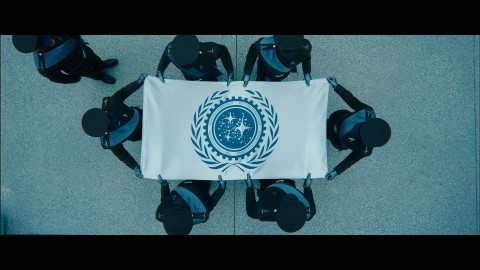
So “to boldly go” may imply “going” with the confidence of strength and leadership, being able to carry out the mission of space exploration while maintaining the ability to keep the crew from harm’s way; whether the “harm” is a force of nature, an aggressive alien species or a vengeful, genetically-engineered human.
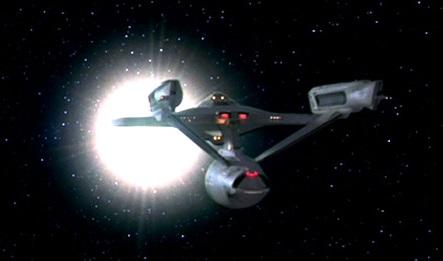
Thanks to panel coordinator AJ Kwan the full presentation is available as a PDF by clicking the link below:
STAR TREK & THE MILITARY

Sigh… If only the U.S. government had a Prime Directive…
Enterprise has been a steamboat and a BALLOON! LOL! That makes me chuckle and smile.
Wait a minute. I didn’t see a balloon on Admiral Marcus’ table!
interesting article
An interesting article and powerpoint. I had not previously considered that Star Trek would have also inspired people into military service (astronauts not withstanding), rather than just the sciences, engineering and technology.
Trekkies really do get everywhere :-)
Oh, nice, freedom of speech and all that…
My comment: “If only the U.S. government had a Prime Directive” has just been deleted….
I thought that, precisely, Star Trek fans would be more open minded than this. What a disappointment.
I’m having a blast with this :D
Star Trek did inspire me to join the U.S Navy. I served for 8 years.
I wonder though, if the military adopted a similar mentality of peaceful exploration to that shown in the Trek, how the world would be…
# 2.
It’s also a Virgin Galactic civilian spaceship; currently undergoing test flights.
And the vessels on Marcus’ desk weren’t just ships called Enterprise; he also had the Kelvin and (oddly) the USS Vengeance (his supposedly ‘top secret’ S31 starship conceived by Khan. Why it was on his desk in plain sight is beyond me…).
@Sebastian – September 18, 2013
I’ve wondered a bit about this myself.
I have two thoughts on this. The first is the ‘real world’ reason: it telegraphed the existence of the Vengeance to the sharp-eyed movie-goer, in a similar fashion to the scenes relating to the dying child and the properties of Harrison’s/Khan’s blood telegraphed it’s use to later resurrect Kirk;.
The second is the ‘in universe’ reason: the Vengeance model could ‘hide in plain sight’ as a concept-starship, in much the same way automotive manufacturers show off concept cars at motor shows. It’s presence on his desk would not necessarily demonstrate it actually existed as a functioning starship. Marcus could admire his baby with no-one the wiser to its existence.
Nah, I think Bob had mentioned someone on the production crew brain farted that one. Vengeance should not have been on his desk.
Yeah, Marcus could just call it a prototype that never entered production. I’d bet there are numerous prototype aircraft models sitting on some Air Force general’s desk somewhere.
HMS Enterprise came first. As a name for a ship it is American by adoption
http://en.wikipedia.org/wiki/HMS_Enterprise
They forgot, in their brief, the CVN-80, the ninth ship to be christened “USS Enterprise” (though we won’t get her until 2025 or 2027)
http://en.wikipedia.org/wiki/USS_Enterprise_(CVN-80)
All the other US Aircraft Carriers, these days, are named after Presidents or Congressmen who had a Naval influence, except for the Enterprise! I love it! They kept the name and her history!
@ 5 – Relax you’re a new commenter, so it had to be approved, your comment is there right where it should be according to the time stamp of the comment, which makes it #1
NSA boss built Star Trek-style command room:
http://m.youtube.com/watch?v=AHVl-LbTDbU
@ 1: Be careful what you wish for. Prime Directive dogmatism would not permit humanitarian aid to advancing nations. They would not allow for any assistance or intervention at all… well beyond the matter of military intervention.
@8. Sebastian – September 18, 2013
“# 2.
And the vessels on Marcus’ desk weren’t just ships called Enterprise; he also had the Kelvin and (oddly) the USS Vengeance (his supposedly ‘top secret’ S31 starship conceived by Khan. Why it was on his desk in plain sight is beyond me…).”
Oh yeah you are correct. My logic fails me when it comes to STID….as does evidently Bad Robot’s. But that’s not what this thread’s about.
The Prime Directive applies to species who are unaware of the existence of Starfleet. It also applies to species who have not developed Warp technology. There really aren’t people who are unaware of the US, and most of them just want to come here for a better life. We have to remember that Star Trek is a fantasy.
#16 You forget, the best place to hide something is in plain sight. Logical?
“Starfleet is not a military organization.”
-Gene Roddenberry, Star Trek TNG Series Bible, page 39
He even underlined it, for emphasis.
They found it unreal that Kirk jumped from snot to Skipper in one leap? Really? Cos it made complete sense to everybody else and was in no way ludicrous at all. No sir, not one bit.
#11 And i’ve been on board the current HMS Enterprise. Sat in the Captains chair too.
Funny thing, I only went along as a visitor on a Navy Day, so I sit in the chair and next thing I know i’m the Captain commanding the ship on an actual mission. So it does happen, honest.
@14 Holy Frack!
How ironic, that D-Bag wastes our money on this crap, but we can’t squeeze two nickles together for the real space program.
Government Prime Directive would be nice like “stay out of the personal lives of the people”
GR’s ribbons look a little sloppy, but I have a feeling they had to line up with the seam in his blouse [jacket or coat to the rest of y’all].
Some may be interested to know that in the days of Napoleon, British captains were court-martialled anytime they lost a ship, so the course of events leading to the loss could be confirmed. I’m sure injustices occurred.
There were also Tall Ships named Enterprise. Yep, the Continental US named a sloop-of-war and a schooner Enterprise, then the US Navy named a schooner, a brigantine, a schooner, a barque-rigged screw, and a sloop with the honored moniker before the 20th century US Navy.
6 Exalted Emperor, Wow, you too? Except I joined the Coast Guard which I feel is a little less “military” in services rendered, thus in keeping with my desires to be in what I thought was the closest thing to Starfleet and would keep me near the water : )
15 Tom, Well, let’s just say I wish the Prime Directive applied to, say, the CIA and the British secret organizations, seeing as that’s where a lot of unrest and foment began in the Arab countries and Latin America.
16 CrazyDaystrom, aren’t the words Bad Robot and logic together in a sentence an oxymoron [like Military Intelligence]?
17 True, that.
20 Stargazer, Yes, but the costs are vastly different. Plus he’s NSA so he can always claim National Security, the frikker.
19 Buzz, you made the leap like Kirk? You must be a super-extra-special geeenius! My hat’s off to you! [If you’re military I know you didn’t. You had to work your way up like every other normal person in this world’s military organisations.]
17, Lore, sorry I forgot to attribute your name
I love the picture in the original post of the various Enterprises. I had always hoped that Franklin Mint or some other similar company would make a collection of all of those Enterprises to scale on a large wall-mounted display releasing one every month or two. I imagine a display that has the ocean at the base with slots for the aircraft carriers, another for the shuttle launching into the atmosphere, and the sky fading into space where the starships would be mounted in orbit. Ah, to dream…
finally some oversite on comments *claps in approval* it wasnt Star trek that got me into the Navy (i blame Macross and her Valkyries for that) but i fully agree that at some level, it probably modivated some folks. But im pretty sure most folks would also say it was Top Gun officially that made peoples decision making, foolish or otherwise…
@7 mellvar
Considering the military acts ONLY on orders by its government, I would suggest you focus your efforts on the US government
@4
I don’t understand how you couldn’t come to a military conclusion? In my Air Force training my instructor used clips of TNG to illustrate leadership situations. Heck, as we saw in DS9, Starfleet is the exploratory and defensive arm of the government of the United Federation of Planets. Seems pretty basic. And awesome. :)
doesn’t this seem a bit obvious?
Cool article! More like this please.
My boyfriend was always a passing fan of scifi but as a Marine he has actually really enjoyed Star Trek. He was a HUGE fan of Trek09 and Into Darkness and he’s really had fun with our Trek nights where we watch my blurays of TOS Enterprise and the original movies. And believe it or not, the fan series Phase 2 with their depiction of Peter Kirk helped him come out to his parents and feel a little more natural about who he is and the work that he does. I’m proud of him and it’s really cool to see the influence that Star Trek has on him.
@ PEB – That’s great :) It’s always nice to hear positive stories about how Trek has influenced people’s lives.
I will always love that pic of the Enterprise-A flying off into the sunset in Star Trek VI. Boy do I miss that ship! ( Both the refit and the “A” ) :-)
Adema in the latter seasons of Trek even that was reversed and messed up by the bad writing.
http://blip.tv/sf-debris-opinionated-reviews/prime-directive-analysis-5638650
and yeah Chain of Command I miss it too, thing is I want to see a proper hybrid of that and the JJ ship, using the stronger bits like the neck and the thicker saucer in its place.
and just overall make the ship stronger, but I may do that myself and post photos of it at cultman tv or the resin model page one of these days after I’m done making a proper grey Excelsior from star trek 6.
@evilboborci on twitter. real thing?
Star Trek is many things to many people. I am not surprised in the least that military-minded individuals see the defense-oriented side of Starfleet.
There is one thing that I recall that makes the discussion predominantly one of how much of a military organization Starfleet is, rather than whether it is one at all. There was a thread on the AOL boards as to whether Starfleet is a civilian organization rather than a “space navy.” The question that made a difference was this: If there was a grave threat to a nation — let’s say, the United States — from a foreign power from overseas, would one depend on the U.S. Coast Guard or the National Oceanic and Atmosphere Administration, on one hand, or the U.S. Navy, on the other? The answer is pretty clear.
Time and again, the Federation sends and depends on Starfleet to protect against mortal threats, such as the Klingons or the Romulans. Thus, by parity of reasoning, Starfleet is the equivalent of the U.S. Navy — not the NOAA or even the U.S. Coast Guard. I think it’s difficult to argue otherwise.
Now would be a good time to mention that even though the USS Enterprise CVN-65 has just retired, the name has a glorious future ahead of it for probably another half century or more, since the newest supercarrier, the most massive, advanced, and powerful warship ever designed, will be none other than the next USS Enterprise — the CVN-80, a Ford-class carrier. This was officially announced by Navy Secretary Ray Mabus via video recording on December 1 2012 during the retirement ceremony for the CVN-65.
The USS Enterprise CVN-80 is scheduled to be in operation by 2025.
Source: Wikipedia and general knowledge.
NOTE: Your comment may need approval from a moderator, please be patient if your comment disappears as soon as you post it, it will reappear as soon as it is approved.
Aye…
very interesting.
I caught myself looking up the various (real life) Enterprises a few months back, too.
But, one thing does stick out in my mind that my brother (he was in the US Navy, circa from 86ish to about 89ish) pointed out to me, that was very unrealistic – in a military sense. In the TNG episode, where Dr Crusher (I think it was her, at least) was left in command. He had said, that even though she had a higher rank than some, in actuality, it would have been anyone else.
I might be way off on my memory, but, I think it was Crusher…maybe it was Troi..I dunno.
This is well written.
“Starfleet is not a military organization.”
-Gene Roddenberry, Star Trek TNG Series Bible, page 39
Then who is? They still have war. They still have defense issues. The “non-military” Enterprise can stand toe to toe with the decidedly military counterparts in foreign navies.
Also, if Starfleet isn’t military and the Federation doesn’t have a military then who goes and defends the borders from Romulan / Klingon / Borg / Cardasian / Dominion?
I think that Mr. Roddenberry may have been speaking metaphorically. Starfleet is not a military organization — alone. It’s something else, but also a military organization.
In the same way, a single individual can be a son, a husband, and a father. He can also be a philosopher, an artist, and a President.
It is said that JFK addressed a group of Nobel laureates assembled for a dinner at the White House by saying that the hall contained the greatest assemblage of talent since Thomas Jefferson dined there — alone. Jefferson was many things, yet one individual.
Starfleet is not a military organization — alone.
I attended this panel at the convention. I enjoyed it. It unfortunate that none of those on the panel were in combat arms job fields. I emailed Creation about hosting one of these at the Grand Slam in LA in Feb. Hopefully they do it . . . and put me on the panel =D
Military = Evil
Starfleet = Good
End of the Story.
What about the Starfleet Marines?
45. Ok, they’re not military. They’re armed, they fight wars, they have a hierarchical rank structure, and they spy.
So what is that makes the other guys that do the same things “evil”?
I’ve always understood that Starfleet had three functions: Exploration, Peacekeeping, and Protection, in any given order. Navy or Coast Guard are both good allegories for the service. Regardless of what you call it, the service does represent the interests of the Federation, and it’s captains have a fair amount of latitude to discharge that duty. Until someone comes along and can offer up a civilian agency that functions in a similar manner, I’ll continue to refer to it as a uniformed service.
37 Hat Rick, Sure it’s the equivalent of the Coast Guard and NOAA, in its rescue or scientific missions.
Not to say the US Navy hasn’t done rescue; I know both the USN and USAF have great rescue organizations within them, but their primary emphasis is defense, which is a function I think Starfleet would fulfill in times of war – but their primary mission – though some forget this – is to seek out new life and new civilizations …
And remember, the Coast Guard is the strong nucleus around which the Navy gathers in time of war ; )
Yours in the friendly tradition of inter-service rivalry … Semper Paratus!
Also, I have to apologize to my military brethren and sistren with a PS here: The USCG is in charge of keeping the U.S. territorial waters safe from intrusion by foreign powers, druggers and other smugglers, terrorist incursions into our ports, and so on.
The USN et. al. usually intercept any foreign powers on their way to the US though : )